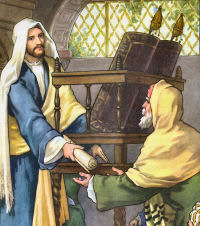Make your gift today!
Help keep Catholics around the world educated and informed.
Already donated? Log in to stop seeing these donation pop-ups.
» Enjoy our Liturgical Seasons series of e-books!
"I give praise to you, Father, Lord of Heaven and earth, for although you have hidden these things from the wise and the learned you have revealed them to little ones. Yes, Father, such has been your gracious will. All things have been handed over to me by my Father. No one knows the Son except the Father, and no one knows the Father except the Son and anyone to whom the Son wishes to reveal him" (Matt 11:25-27).
The Optional Memorial of St. Maria Goretti is suppressed because of the Sunday liturgy.
Sunday Readings
The first reading is taken from the Book of the Prophet Zechariah 9:9-10 and indicates that the humility asked for by Jesus is the kind that he himself endured, for he came in meekness and without pageantry, yet his dominion would be to the ends of the earth. The example of the humble servant is the very person of Jesus himself who invites us in the second part of the gospel to come to Him for refreshment and rest. — A Celebrants Guide to the New Sacramentary - A Cycle by Kevin W. Irwin
The second reading is from the Letter of St. Paul to the Romans 8:9, 11-13 and contains one of the most important yet often misunderstood themes of St. Paul. The hellenistic dichotomy between the lower and higher nature is not found here, for flesh and spirit mean the whole man and the whole man stands in need of redemption by Christ. The Pauline teaching is not that part of man is redeemed and part of him is damnable. Rather man's whole personality is redeemed by the sacrifice of Christ. The vocation of the Christian, both "body" and "soul," is to conform his already redeemed person to the same Spirit he has already received at baptism. — A Celebrants Guide to the New Sacramentary - A Cycle by Kevin W. Irwin
The Gospel is from St. Matthew 11:25-30. The complexities of our big and small choices and reasons throughout our lives boil down to two results. Either we have freely chosen to go to our heavenly Father, or we have freely chosen to go elsewhere.
And there is only one elsewhere.
Today in his Gospel, Jesus calls it by the Hebrew name of “Gehenna.”
To the south and west of ancient Jerusalem, the valley of Gehenna was where men used to sacrifice and burn their sons and daughters to gain some selfish favor from the idol Moloch.
Later, in the time of Jesus, Gehenna was a place to dump and burn trash.
In the teaching of Jesus, God lets us choose Gehenna for ourselves.
Choices always have consequences: either unto life with God, or unto Gehenna.
Depending on our choices, Jesus says today he will deny us before his Father if we deny him before men.
He tells us today to “be afraid” of being destroyed body and soul in Gehenna.
Yet, he also says three times today, “do not be afraid.”
Our reason to stand against fear is that God in Christ has given us both the gift of a new beginning and the gift of a final success story.
Christ is the new beginning of the human race, and Christ is the final success story of the human race.
Christ the Son of God chose to remain faithful to the Father, but he chose to do so as a human being— as one of us, as the head of our race.
He chose to take upon himself the consequences of our sinful choices.
By embracing, entering and swallowing OUR deadly, hell-bound POVERTY, Christ gave us the WEALTH of HIS freedom and faithfulness as Son of God.
God has handed over to us his own freedom in his Son, to save our souls and bodies, even counting the hairs of our heads.
The Moloch worshipers sacrificed their children in Gehenna for selfish gain.
God in Christ has sacrificed his Son on Golgotha not for selfish gain but for us.
Let us not deny him by wasting his Body and Blood through our choices to do anything that is not open to God.
The choices that authentically free us always acknowledge and reveal the Father from whom we came and the Father to whom we are returning.
Excerpted from Father Stephanos, O.S.B. (One Monk of the Order of Saint Benedict)






